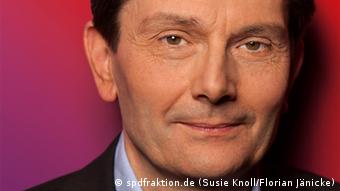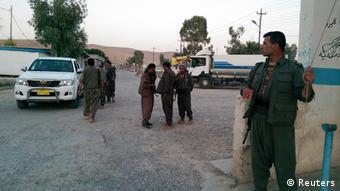PKK - from terrorist threat to ally?
The Kurdistan Workers Party (PKK) is banned in Germany. The EU deems it a terrorist group. Now, however, regarding the threat from 'IS,' some German politicians appear ready to begin discussions over reconsidering.
Summer 1993: Kurdistan Workers Party (PKK) members storm the Turkish consulate in Munich. They take hostages and demand of German Chancellor Helmut Kohl that he increase support for Kurdish rights.
The PKK carried out dozens of attacks that year on Turkish institutions in Germany, often as arson attacks. The battle that the PKK had been fighting against Turkey since the 1980s had also arrived in Germany.
The Kurds have long fought for their own state, an independent Kurdistan, as their settlements are spread across several countries: Turkey, Syria, Iran and Iraq. In these attacks, primarily in eastern Turkey and neighboring border regions, tens of thousands of people were killed - Turkish soldiers, PKK fighters, and thousands of civilians as well.
Since then, many countries have classified the Marxist-oriented PKK as a terrorist organization. This view is shared by the European Union and NATO. PKK leader Abdullah Öcalan has been in Turkish custody for years, though this did not harm the popularity of the party with Kurds - quite the opposite in fact.
Relaxing tensions
Times have changed, however. Öcalan has called for non-violence, and since last year, a truce has been in place. The goal of an independent state no longer seems to be an issue. Now it is about increased autonomy and rights for Kurds in their settlement areas. Turkish President Recep Tayyip Erdogan announced as he took office, that the peace process with the Kurdish minorities would be taken up again.
This coming Monday, September 1, the Turkish government and the PKK leadership will begin such discussions.
The image of the Kurds in Turkey is slowly changing. "We have to recognize that the Kurdish candidate has achieved a remarkable result in the presidential election," German SPD politician Rolf Mützenich said. Selahattin Demirtaş received nearly 10 percent of the vote in the election. He is committed to non-violence and believes he can negotiate with the Turkish government for more rights for the Kurdish people.
From terrorism to fighting terror
The PKK's rage, which in the past was directed against Turkey, has turned now against a common enemy: the terrorist militia, " Islamic State," (IS). PKK fighters have already delivered several military defeats against IS. It is also said that PKK allies helped to free Iraqi Yazidi refugees who had fled from IS into the mountains. The battle-hardened PKK seems to be even more successful than the armed forces of the autonomous region of Kurdistan in northern Iraq, known as the Peshmerga.
The West is placing their hope in the Peshmerga in the battle against the IS terrorists. The Kurdish troops will supposedly be supplied with weapons from Germany, France and the United Kingdom, and they will be given air support by the United States, because the Kurdish autonomous region in northern Iraq has no air force.
It is thought that Peshmerga fighters and supporters of the PKK have already fought side-by-side against IS terrorists. As it seems - unfortunately for Chancellor Angela Merkel, who has made it clear she wants German arms to be delivered to the Peshmerga only and not to the PKK - there isn't really any big difference between the two Kurdish organizations.
Look to Turkey
Rolf Mützenich, the foreign policy spokesman for the German Social Democrat Party (SPD); is skeptical about delivering weapons to crisis areas, though Foreign Minister Frank Walter Steinmeier, also an SPD member, has spoken out in favor of it. He claims this situation is different.
Mützenich has long believed it is sensible to have a discussion about the classification of PKK as a terrorist group in Germany, and he is not alone. Opposition politician Frithjof Schmidt of the Green Party sees it similarly. He told the Frankfurter Allgemeine Zeitung (FAZ), there is every reason to re-examine the classification, as, in the long-term, the PKK has the potential to be political actor in Turkey and play a role in its bordering regions. If the Turkish government has already started rethinking its attitude toward the PKK, Germany could also consider it, the politicians believe.

SPD foreign policy spokesman Rolf Mützenich believes a debate over legalizing the PKK should be held
Lengthy discussion
Mützenich argues: "What is currently being tested in Turkey will impact Germany and other European countries in the foreseeable future." The discussion should be held now, the foreign policy expert says, "but certainly not because of any weapons deliveries." Green Party politician Konstantin von Notz also told the FAZ that the debate should not be used as a lever to justify weapons delivery to the PKK.
Only few expect a quick decision to legalize the PKK in Germany. The European Union as a whole has classified the PPK as a terrorist group, therefore the EU would have to uniformly rescind that decision. In Germany, however, the government does not seem ready to change its attitude. DW DE




No comments:
Post a Comment